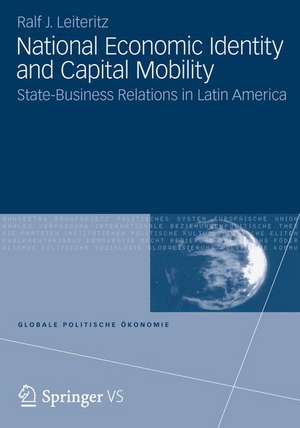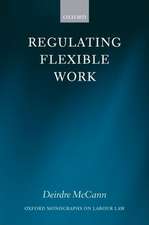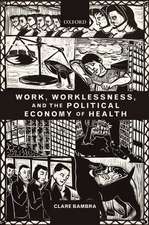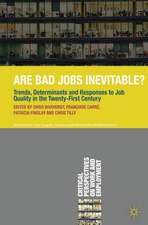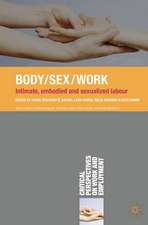National Economic Identity and Capital Mobility: State-Business Relations in Latin America: Globale Politische Ökonomie
Autor Ralf J. Leiteritzen Limba Engleză Paperback – 21 apr 2012
Preț: 349.53 lei
Nou
Puncte Express: 524
Preț estimativ în valută:
66.88€ • 69.97$ • 55.56£
66.88€ • 69.97$ • 55.56£
Carte tipărită la comandă
Livrare economică 02-16 aprilie
Preluare comenzi: 021 569.72.76
Specificații
ISBN-13: 9783531185286
ISBN-10: 3531185284
Pagini: 175
Ilustrații: 175 p. 10 illus., 3 illus. in color.
Dimensiuni: 168 x 240 x 15 mm
Greutate: 0.29 kg
Ediția:2012
Editura: VS Verlag für Sozialwissenschaften
Colecția VS Verlag für Sozialwissenschaften
Seria Globale Politische Ökonomie
Locul publicării:Wiesbaden, Germany
ISBN-10: 3531185284
Pagini: 175
Ilustrații: 175 p. 10 illus., 3 illus. in color.
Dimensiuni: 168 x 240 x 15 mm
Greutate: 0.29 kg
Ediția:2012
Editura: VS Verlag für Sozialwissenschaften
Colecția VS Verlag für Sozialwissenschaften
Seria Globale Politische Ökonomie
Locul publicării:Wiesbaden, Germany
Public țintă
ResearchCuprins
The Economics of Capital Account Policy.- The International Monetary Fund and Capital Account Liberalization. A Case of Failed Norm Institutionalization.- Capital Account Policy in Peru. The Institutional Legacies of the Economic Crisis.- Capital Account Policy in Colombia. The Institutional Legacies of Pragmatism.- Conclusions.- Appendix 1: List of Interviewees.- Appendix 2: Survey Questions for Foreign-trained Elite Economists in Colombia and Peru.
Recenzii
"Until the Great Recession of 2008, "global policy" on international capital flows presumed that all countries should be open to free capital flows in and out. In the wake of the crisis, even the International Monetary Fund, long a standard-bearer for free capital flows, has moderated its position. But, as Ralf Leiteritz shows in this careful study of Peru and Col ombia, what happens at the country level depends not only on what global actors think is best but also on norms, interests and institutions at the country level, as they come together to define "national identity". The book is a masterclass in empirical political economy. "
Robert H. Wade,´Professor of Political Economy, London School of Economics and Political Science
"Leiteritz’s brilliant book convincingly connects domestic informal institutions to the international financial architecture. Demonstrating that these domestic institutions are essential for understanding the durability of national commitments to the international norm of capital mobility, Leiteritz brings a broad array of qualitative and quantitative evidence to bear on his empirical narratives. In addition to a broad-ranging analysis of systemic norms and rules, Leiteritz’s book provides in-depth studies of two fascinating Latin American nations and their experiences with financial regulation. This book is an important contribution to both comparative and international political economy and should enjoy a wide audience of scholars, policy makers, and financial market participants."
Rawi Abdelal, Joseph C. Wilson, Professor of Business Administration, Harvard Business School
"This thoughtful and well-researched volume plugs an important whole in the understanding of capital account liberalization. The author’s findings on Peru and Colombia suggest the crucial variable that explains the sustainability of openness is whathe calls national economic identity. Leiteritz’s examination of this key dimension of liberalization will be of interest to those who want to understand change in developing countries, the social foundations of reform, and Latin American politics."
Timothy Sinclair, Associate Professor of International Political Economy, University of Warwick
Robert H. Wade,´Professor of Political Economy, London School of Economics and Political Science
"Leiteritz’s brilliant book convincingly connects domestic informal institutions to the international financial architecture. Demonstrating that these domestic institutions are essential for understanding the durability of national commitments to the international norm of capital mobility, Leiteritz brings a broad array of qualitative and quantitative evidence to bear on his empirical narratives. In addition to a broad-ranging analysis of systemic norms and rules, Leiteritz’s book provides in-depth studies of two fascinating Latin American nations and their experiences with financial regulation. This book is an important contribution to both comparative and international political economy and should enjoy a wide audience of scholars, policy makers, and financial market participants."
Rawi Abdelal, Joseph C. Wilson, Professor of Business Administration, Harvard Business School
"This thoughtful and well-researched volume plugs an important whole in the understanding of capital account liberalization. The author’s findings on Peru and Colombia suggest the crucial variable that explains the sustainability of openness is whathe calls national economic identity. Leiteritz’s examination of this key dimension of liberalization will be of interest to those who want to understand change in developing countries, the social foundations of reform, and Latin American politics."
Timothy Sinclair, Associate Professor of International Political Economy, University of Warwick
Notă biografică
Ralf J. Leiteritz is Associate Professor of International Relations at the Universidad del Rosario in Bogotá, Colombia.
Textul de pe ultima copertă
Why has capital account liberalization been a durable policy in some countries, but not in others? The book uses the contrast between the path pursued by Peru and Colombia regarding capital account policy during the last twenty years in order to identify two critical factors to account for this puzzle. First, changes in domestic informal institutions – defined as shared collective understandings about legitimate economic policies – are a necessary element of sustainable capital account policy choices. Only if the remains of the previous model of economic development associated with state intervention have been purged from the set of acceptable policies, does capital account openness persist over time. Second, sustainable capital account liberalization presupposes that business-government relations privilege the interests of economic sectors that depend on the unfettered flow of international capital and are largely unaffected by exchange-rate volatility over the interests of exporters worried about exchange-rate appreciation in the context of capital account openness.
Caracteristici
Reasons for capital account liberalization National Economic Identity and Capital Account Policy The examples Peru and Colombia
